
The New Zealand Wars were a series of armed conflicts that took place in New Zealand from 1845 to 1872 between the New Zealand government and the Māori. Until at least the 1980s, European New Zealanders referred to them as the Māori wars; the historian James Belich was one of the first to refer to them as the "New Zealand wars", in his 1987 book The New Zealand wars and the Victorian interpretation of racial conflict.
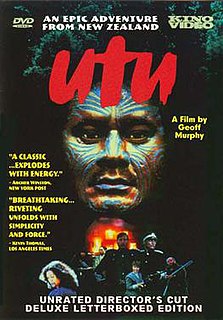
Utu is a 1983 New Zealand film directed and co-written by Geoff Murphy. Anzac Wallace, who had done little acting up until that point, takes the starring role of Te Wheke, a warrior who sets out to get vengeance after British forces kill his people. The cast also includes Bruno Lawrence and Kelly Johnson. Sometimes described as "a Maori Western", Utu was reputed to have one of the largest budgets for a New Zealand film up until that time.
Frederick Edward Maning was a notable early settler in New Zealand, a writer and judge of the Native Land Court. He published two books under the pseudonym of "a Pakeha Maori."

Temuera Derek Morrison is a New Zealand actor who first gained recognition for his role as Dr. Hone Ropata on the New Zealand soap opera Shortland Street. He gained critical acclaim after starring as Jake "The Muss" Heke in the 1994 film Once Were Warriors and its 1999 sequel What Becomes of the Broken Hearted?.

Sir Howard Leslie Morrison was a New Zealand entertainer. From 1964 until his death in 2009 he was one of New Zealand's leading television and concert performers.

John Lucas VC was a British Army soldier and a recipient of the Victoria Cross, the highest award for gallantry in the face of the enemy that can be awarded to British and Commonwealth forces.
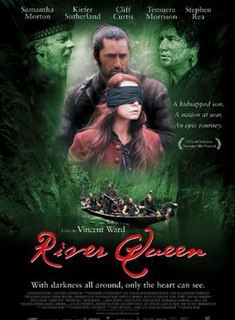
River Queen is a 2005 New Zealand-British war drama film directed by Vincent Ward and starring Samantha Morton, Kiefer Sutherland, Cliff Curtis and Stephen Rea. The film opened to mixed reviews but performed well at the box office in New Zealand.
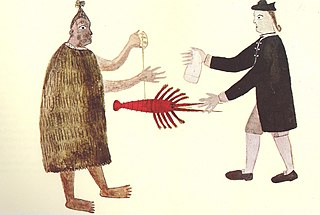
The military history of New Zealand is an aspect of the history of New Zealand that spans several hundred years. When first settled by Māori almost a millennium ago, there was much land and resources, but war began to break out as the country's carrying capacity was approached. Initially being fought with close range weapons of wood and stone, this continued on and off until Europeans arrived, bringing with them new weapons such as muskets. Colonisation by Britain led to the New Zealand land wars in the 19th century in which settler and imperial troops and their Māori allies fought against other Māori and a handful of Pākehā. In the first half of the 20th century, New Zealanders of all races fought alongside Britain in the Boer War and both World Wars. In the second half of the century and into this century the New Zealand Defence Force has provided token assistance to the United States in several conflicts. New Zealand has also contributed troops extensively to multilateral peacekeeping operations.

Rena Owen is a New Zealand actress in theatre, television and film. Owen is best known for her leading role as Beth Heke in Lee Tamahori's Once Were Warriors and as Taun We in George Lucas's Star Wars: Episode II – Attack of the Clones.

John Bryce was a New Zealand politician from 1871 to 1891 and Minister of Native Affairs from 1879 to 1884. In his attitudes to Māori land questions, he favoured strict legal actions against Māori opposed to alienation, and he personally directed the invasion of Parihaka and the arrest of the leaders of the movement.
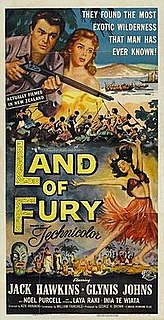
The Seekers is a 1954 British adventure film produced by the Universal-International studio syndicate from Hollywood in Los Angeles, California, directed by Ken Annakin. It starred Jack Hawkins, Glynis Johns, Noel Purcell, and Kenneth Williams.
Rain of the Children is a 2008 feature film written, directed and produced by Vincent Ward.

Dr. Hone Ropata is a fictional character on the New Zealand soap opera Shortland Street who was portrayed by Temuera Morrison as part of the original cast. Morrison maintained the role for three years before briefly reprising in it 2008 to commemorate the show's 4000th episode.

The Devil's Rock is a 2011 New Zealand supernatural war film produced by Leanne Saunders, directed by Paul Campion, written by Campion, Paul Finch, and Brett Ihaka, and starring Craig Hall, Matthew Sunderland, Gina Varela, and Karlos Drinkwater. It is set in the Channel Islands on the eve of D-Day and tells the story of two New Zealand commandos who discover a Nazi occult plot to unleash a demon to win World War II. The film combines elements of war films and supernatural horror films. The film was theatrically released on July 8, 2011 in the United Kingdom and September 22, 2011 in New Zealand. The film received mixed reviews from critics with the majority rating it average to above average and with many audience viewers on IMDB giving it a higher than average review.

Francis Morphet Twisleton was a New Zealand soldier who served in the Boer War and the First World War and became well known for his writings of soldiering life.
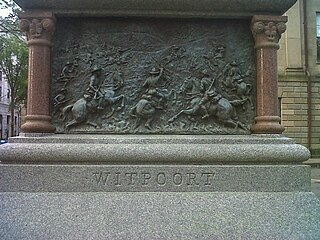
The Battle of Witpoort was a battle during the Second Anglo-Boer War. Major Frederick Henry Munn commanded the detachment of the Royal Irish Fusiliers at Witpoort which was attacked on 16 July 1900, his orders being to "hold his position at all costs". The Boers called on Major Munn to surrender, but, scornfully refusing, he held out from daybreak till 2 pm, when the Canadian forces mounted a counterattack and the Boers retired. The battle became famous because of the death of Harold Lothrop Borden.
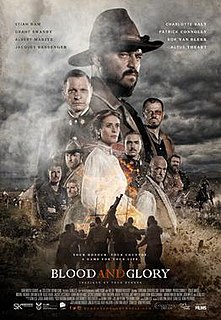
Blood and Glory is a feature film that was released to cinema in April 2016 in South Africa. The film, set during the Second Boer War in 1901, is a period drama that follows Willem Morkel, a Cape Rebel Boer/Afrikaans farmer who was captured and sent to a British prisoner of war camp on St. Helena Island in the Atlantic Ocean. Placed under terrible oppression and hardship, Morkel and his comrades slowly come together to assert their defiance, humanity and human spirit and, more specifically, through the game of rugby.
The Queen's Scarf was awarded to British and colonial soldiers for bravery during the Second Boer War (1899–1902). Eight scarves were personally crocheted by Queen Victoria and presented to soldiers.























